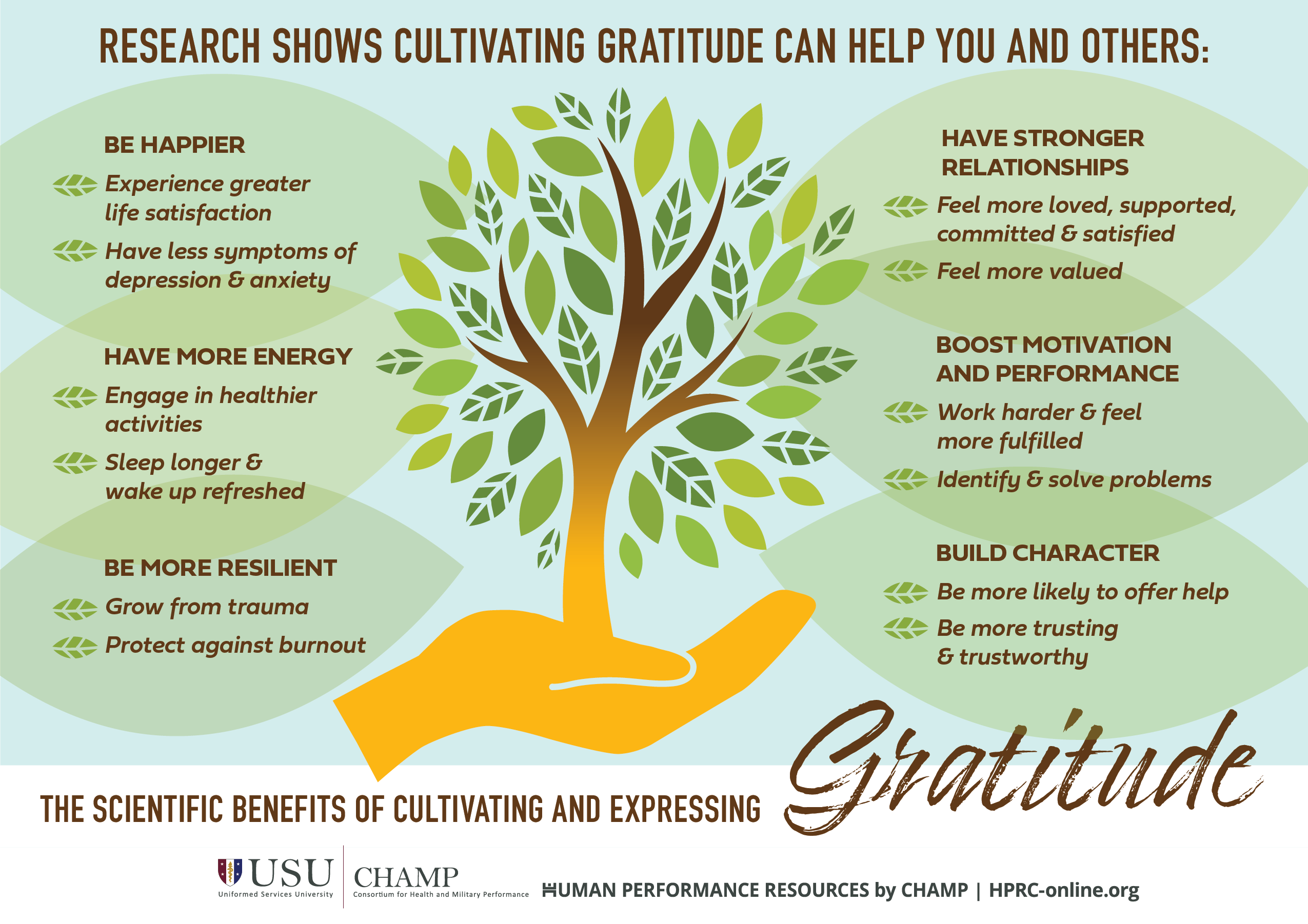The science of gratitude shows positive effects on mental health and well-being. Research supports its benefits.
Gratitude practices can lead to improved relationships, increased happiness, and better physical health. By focusing on what we are thankful for, we shift our perspective towards positivity. Cultivating gratitude can be a simple yet powerful tool in enhancing overall life satisfaction and emotional resilience.
Numerous studies indicate that expressing gratitude regularly can reduce stress, boost self-esteem, and increase empathy. This psychological phenomenon taps into the brain’s reward system, promoting feelings of joy and contentment. Let’s explore the transformative impact of gratitude on our minds and bodies.

Credit: www.templeton.org
The Science Behind Gratitude
Discover the fascinating science behind gratitude and its profound impact on our well-being. Explore how practicing gratitude can enhance happiness, boost resilience, and improve overall mental and physical health. Uncover the secrets of gratitude through scientific research and learn how to cultivate a grateful mindset for a more fulfilling life.
Gratitude is a powerful emotion that has been linked to numerous mental and physical health benefits. It is the act of being thankful and showing appreciation for the good things in life. But what exactly happens in our brains and bodies when we experience gratitude? Let’s explore the science behind gratitude.Chemical Triggers Linked To Gratitude
When we feel grateful, our brains release a cocktail of chemicals that contribute to our feelings of happiness and well-being. The two primary chemicals associated with gratitude are dopamine and serotonin. Dopamine is a neurotransmitter that helps regulate our brain’s reward and pleasure centers. It is released when we experience something pleasurable, like receiving a gift or accomplishing a goal. Serotonin, on the other hand, is a neurotransmitter that helps regulate our mood and social behavior. It is often referred to as the “feel-good” chemical because it contributes to feelings of happiness and well-being. When we express gratitude, our brains release both of these chemicals, which can lead to a boost in mood and overall sense of happiness.Neurological Impact Of Thankfulness
Gratitude has also been shown to have a significant impact on our neurological health. Studies have found that practicing gratitude can increase activity in the prefrontal cortex, which is the part of the brain responsible for executive function, decision-making, and emotional regulation. This increased activity in the prefrontal cortex can lead to better cognitive function and improved mental health. In addition, gratitude has been linked to a decrease in activity in the amygdala, which is the part of the brain responsible for processing emotions like fear and anxiety. This decrease in activity can lead to a reduction in stress and anxiety levels, as well as improved overall emotional regulation.In conclusion, the science behind gratitude shows us that it is not just a nice sentiment, but a powerful emotion that can have a significant impact on our mental and physical well-being. By understanding the chemical and neurological processes involved in gratitude, we can better appreciate the importance of expressing gratitude in our daily lives.Historical Perspectives On Gratitude
Ancient Philosophies On Thankfulness
Ancient civilizations, including the Greeks, Romans, and Egyptians, embraced the concept of gratitude as a fundamental virtue. Philosophers such as Cicero and Seneca emphasized the importance of being thankful for life’s blessings. In Eastern cultures, Confucianism and Buddhism also promoted the practice of gratitude, recognizing its transformative power on the individual and society.
Evolution Of Gratitude In Society
Over time, expressions of gratitude became deeply embedded in societal norms and rituals. From religious ceremonies to secular traditions, the act of giving thanks permeated various aspects of human interaction. In modern times, the scientific exploration of gratitude has shed light on its psychological and physiological impacts, further solidifying its significance in human history.
Gratitude And Mental Health
Gratitude has a profound impact on mental health, as supported by the science of gratitude. Research shows that cultivating a grateful mindset can enhance well-being, reduce stress, and promote positive emotions, making it an essential practice for maintaining good mental health.
Alleviating Depression With Gratitude
Depression can be a debilitating condition that affects millions of people worldwide. However, practicing gratitude has shown promising results in alleviating the symptoms of depression.
Research has indicated that expressing gratitude can have a positive impact on mental well-being. By focusing on the things we are grateful for, we shift our attention away from negative thoughts and emotions, allowing us to experience more positive emotions and improve our overall mood.
Gratitude exercises, such as keeping a gratitude journal or writing thank-you notes, have been found to be effective in reducing symptoms of depression. These simple practices help individuals develop a more positive mindset and increase their resilience in the face of challenges.
Gratitude’s Role In Building Resilience
Building resilience is crucial for maintaining good mental health, especially during difficult times. Gratitude plays a significant role in developing and strengthening resilience.
When we focus on the things we are grateful for, we train our minds to see the silver linings in challenging situations. This shift in perspective allows us to approach difficulties with a more positive and resilient mindset, enabling us to bounce back quicker from setbacks and adversities.
Practicing gratitude also helps cultivate a sense of appreciation for the present moment, rather than dwelling on past regrets or anxiously anticipating the future. This mindfulness and presence contribute to our ability to adapt and cope effectively with stressors.
Furthermore, gratitude fosters social connections and support networks, which are vital for resilience. When we express gratitude towards others, we strengthen our relationships and build a sense of community. These connections can provide emotional support during challenging times and enhance our overall well-being.
Incorporating gratitude into our daily lives can be as simple as taking a few moments each day to reflect on the things we are grateful for or expressing gratitude towards others. These small acts can have a significant impact on our mental health, helping us build resilience and navigate life’s ups and downs with greater ease.
Physical Health Benefits
Gratitude has been scientifically proven to have physical health benefits. Research shows that practicing gratitude can lead to improved sleep, reduced stress, and a strengthened immune system. Engaging in grateful thinking and appreciation can positively impact overall well-being.
Gratitude’s Effect On Physical Well-being
In addition to its positive impact on mental and emotional health, gratitude has been found to have significant benefits for physical well-being. Research has shown that practicing gratitude regularly can lead to a range of physical health improvements, from enhanced immune function to reduced symptoms of chronic pain.
Longevity And Grateful Living
One of the most remarkable findings regarding gratitude and physical health is its association with longevity. Studies have shown that individuals who regularly express gratitude tend to have a longer lifespan compared to those who do not. This may be attributed to the fact that gratitude helps to reduce stress, promote better sleep, and foster healthier lifestyle choices.
A study conducted by researchers at the University of California, Davis, found that individuals who kept gratitude journals experienced fewer health complaints and reported exercising more regularly compared to those who did not practice gratitude. This suggests that cultivating a grateful mindset can have a direct impact on overall physical well-being.
Furthermore, gratitude has been linked to improved cardiovascular health. Research has shown that grateful individuals have lower blood pressure, reduced inflammation, and a lower risk of heart disease. This may be attributed to the positive emotions associated with gratitude, which can counteract the harmful effects of chronic stress on the body.
Practicing gratitude has also been found to boost the immune system. Grateful individuals tend to have higher levels of antibodies, which play a crucial role in fighting off infections and diseases. Additionally, gratitude has been shown to increase the production of hormones that contribute to overall well-being, such as serotonin and oxytocin.
Incorporating gratitude into daily life can have a profound impact on physical health. Whether through keeping a gratitude journal, expressing appreciation to others, or simply taking a moment to reflect on the things we are thankful for, practicing gratitude is a simple yet powerful way to promote overall well-being.
Cultivating A Grateful Mindset
Developing a grateful mindset is a fundamental aspect of embracing the science of gratitude. Cultivating a grateful mindset involves training the brain to focus on the positive aspects of life, which can lead to enhanced well-being and mental resilience. By consciously acknowledging and appreciating the good in our lives, we can rewire our thought patterns and elevate our overall sense of contentment.
Daily Practices For Enhancing Gratitude
Engaging in daily practices to enhance gratitude can significantly contribute to fostering a grateful mindset. Consider incorporating the following activities into your routine:
- Keep a gratitude journal to jot down things you are thankful for each day.
- Express appreciation to others through heartfelt gestures or notes.
- Engage in mindfulness exercises to bring awareness to the present moment.
- Reflect on positive experiences and identify lessons learned from challenges.
Challenges And Solutions In Adopting Gratitude
Although adopting a grateful mindset can be transformative, it may come with its own set of challenges. Some common obstacles include:
- Difficulty in finding things to be grateful for during tough times.
- Feeling insincere or forced when expressing gratitude.
- Overcoming ingrained negative thought patterns and biases.

Credit: www.youtube.com
Measuring Gratitude
Understanding the impact of gratitude requires precise measurement. By quantifying gratitude, researchers can gain valuable insights into its effects on mental well-being and overall happiness.
Tools And Scales For Assessing Thankfulness
Various tools and scales are utilized to measure the levels of gratitude in individuals. These assessments help researchers understand the depth and intensity of thankful emotions.
Research Findings On Quantifying Gratitude
Studies have shown that quantifying gratitude can lead to a better understanding of its psychological and emotional benefits. Researchers use data from these assessments to analyze the correlation between gratitude and mental health.
Gratitude In Relationships
Gratitude in relationships has been scientifically proven to increase feelings of closeness and happiness. By expressing gratitude towards our partners, we can strengthen our bonds and create a more fulfilling relationship. Research shows that practicing gratitude can lead to improved communication, increased trust, and a more positive overall outlook on the relationship.
Strengthening Bonds Through Appreciation
Gratitude in relationships fosters connection and trust.When you express appreciation, it deepens emotional intimacy.Appreciating your partner’s efforts strengthens the bond.A simple “thank you” can make a big difference.The Ripple Effect Of Sharing Gratitude
Sharing gratitude creates a positive cycle.Expressing thanks encourages more acts of kindness.Gratitude leads to a happier and healthier relationship.Appreciation is contagious and spreads joy.Incorporating gratitude into relationships is beneficial.Gratitude Interventions
Gratitude interventions are scientifically proven methods to cultivate thankfulness and positivity. By practicing gratitude, individuals can experience improved mental well-being and enhanced relationships. Research shows that gratitude interventions can boost overall happiness and life satisfaction.
Structured Programs And Their Outcomes
Gratitude interventions involve structured programs for enhancing well-being.These programs often include journaling, reflecting on positive experiences, and acts of kindness.Participants in gratitude programs report increased happiness and life satisfaction.Incorporating Gratitude In Therapy
Therapists integrate gratitude practices to promote mental health.Gratitude exercises help individuals focus on positive aspects of their lives.Expressing gratitude can reduce symptoms of depression and anxiety.Consider incorporating gratitude interventions into your daily routine.Challenges In Fostering Gratitude
Developing a mindset of gratitude can be challenging, but it’s essential for overall well-being.
Dealing With Gratitude Blocks
Identifying and addressing what hinders gratitude is crucial for personal growth.
Overcoming Entitlement And Negativity
Shifting focus from entitlement to appreciation can transform perspectives.
The Future Of Gratitude Research
Emerging Trends In Gratitude Studies
Scientists and researchers are actively exploring new dimensions of gratitude, uncovering its intricate effects on mental and physical well-being. The emerging trends in gratitude studies encompass neuroscientific investigations, cross-cultural analyses, and the impact of gratitude on interpersonal relationships.
Potential Impacts On Society And Policy
The future of gratitude research holds the promise of influencing societal dynamics and policy-making. By delving into the potential impacts on society and policy, researchers aim to underscore the relevance of gratitude in fostering empathy, resilience, and social cohesion. These insights could potentially inform public health initiatives and educational curricula.

Credit: www.hprc-online.org
Frequently Asked Questions
What Is The Science Behind Gratitude?
Gratitude has been scientifically proven to improve mental and physical well-being. It activates the brain’s reward center, releases dopamine and serotonin, and reduces stress hormones. Practicing gratitude also strengthens relationships and enhances empathy.
How Does Gratitude Impact Mental Health?
Gratitude positively impacts mental health by reducing symptoms of depression and anxiety. It fosters a positive mindset, increases resilience, and promotes emotional well-being. By focusing on the present and appreciating what one has, gratitude can improve overall mental health.
Can Gratitude Improve Physical Health?
Yes, gratitude can improve physical health by reducing inflammation, lowering blood pressure, and enhancing immune function. Studies have shown that individuals who practice gratitude experience fewer aches and pains, better sleep, and are more likely to engage in healthy activities.
Conclusion
Gratitude is a powerful emotion that can positively impact our mental and physical health. The science of gratitude shows that practicing gratitude can increase happiness, improve sleep quality, reduce stress and anxiety, and even boost our immune system. By focusing on the good things in our lives and expressing appreciation, we can cultivate a more positive outlook and experience greater well-being.
So take a moment each day to reflect on what you are grateful for and see how it can transform your life.


